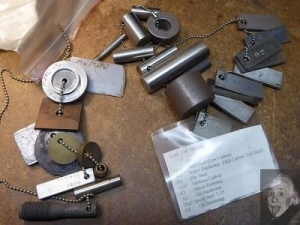Being able to identify the material you're about to machine has many advantages. Sadly, we all have plenty of "who knows?" material in the stock rack.
One way to identify metals is the spark test. The unknown is applied to a grinding wheel and the color and form of the sparks are "analyzed" to make the identification. Other tests involve applying acids or chemicals to the material and noting the reaction or lack thereof to identify. The internet will provide plenty of spark illustrations and chemical approaches.
Unfortunately, all these tests are rather subtle and, with the multiplicity of metal formulations available today, easily subject to error.
It helps immensely to have samples of different metals available for both spark and chemical testing. Being able to perform the test on a known material and observe the outcome makes interpreting the test on the unknown much easier.
Whenever I encounter a material whose pedigree is known UNEQUIVOCALLY, I grab a sample, drill a hole in it and thread it onto one of my two sample chains...
Most of the samples have their identification engraved on them. Smaller samples have an identifying number with details for that number on an accompanying card.
If you belong to a model engineering, hobby machining or live steam railroading club, solicit your club-mates to provide samples to their fellows. That's how many of these samples were obtained. Stress the fact that the metal's type must be known beyond doubt.
Another advantage of having such a collection is that it provides an opportunity for accessing the machinability and job applicability of a particular material prior to committing to buying a lot of stock that turns out to be not ideal for the intended use.


 LinkBack URL
LinkBack URL About LinkBacks
About LinkBacks



 Reply With Quote
Reply With Quote




Bookmarks